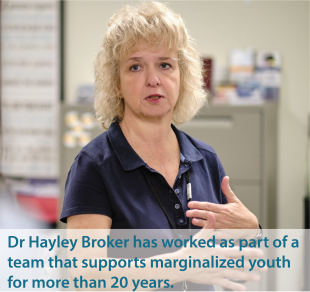Across BC, more and more family practices are making the move towards team-based care. Not only does having a group of medical professionals working collaboratively from the same office help doctors optimize their time, a team approach improves patient care by giving them access to broader depth and breadth of support in one place.

Recognizing the benefits of team-based care is easy but widespread adoption of the concept is still quite new for some. Family doctors may be unsure of how to make the shift. Teams that have already come together may be used to different office management styles or have varying ways of communicating, and be unsure of how to implement an optimized approach that works best for everyone.
Enter the latest learning series from the Practice Support Program (PSP). This interactive, seven-part series provides customized, hands-on support for interprofessional teams at any point along the path to a practice becoming a patient medical home.
Session facilitator Dr Hayley Broker’s work with at-risk youth has led her to work with multi-disciplinary teams at clinics in an alternative high school and Foundry youth wellness centres.
“Team-based care can offer patients a one-stop shop for their primary care needs,” says Dr Broker.
“That’s particularly valuable for vulnerable populations like marginalized youth, so it’s something I’ve been part of for more than 20 years. I learned each team works differently and making sure everyone has common expectations and knowledge of how things work in that particular office is valuable for both practitioners and patients.”
PSP developed the curriculum for the team-based care learning series with input from physicians and others with lived experience and insights. The sessions address seven topics:
- Foundations: Introducing team-based care and interprofessional competencies, role clarification and medico-legal liability.
- Patient-Centred Care: Developing a team that enhances quality patient care.
- Interprofessional Communication: Understanding individual styles and building effective interprofessional communication.
- Team-Functioning: Developing strategies and mechanisms to work together.
- Interprofessional Conflict Management: Understanding and resolving interprofessional conflict
- Collaborative Leadership: Understanding characteristics, mechanisms and benefits of collaborative leadership.
- TBC Practice Approach: Integrating content to support the development of a team-based care approach for a practice team.
Each session runs approximately two-and-a-half hours, with registration capped at 20 participants.
“These are highly interactive sessions, because each team has things that are unique about it and the goal is to provide customized support for each office group,” says Dr Broker. “We strongly encourage whole teams to participate, because team-building is a collaborative process and works best when everyone has their say in identifying how things are going to run.”
The sessions are adapted to each teams’ needs, so even established teams begin with the Foundations session. After that first session, teams can complete the other six sessions until the final session, when all the learnings are brought together to build an action plan.
“One of the things I think is so valuable about the learning series is the ongoing support PSP provides throughout the process,” says Dr Broker. “These aren’t classes, they’re flexible workshops, and in that four to eight week gap between sessions, someone from PSP is available to come into each team’s office to help them apply what they have learned. The action plan at the end does bring it all together but there’s support all the way along the process, so it’s not overwhelming.”
The team-based care learning series is accredited by the College of Family Physicians of Canada for up to 48 MainPro+ credits. As well, all participants received sessional compensation in recognition of the time invested.
To learn more, contact a PSP Regional Support Team.
